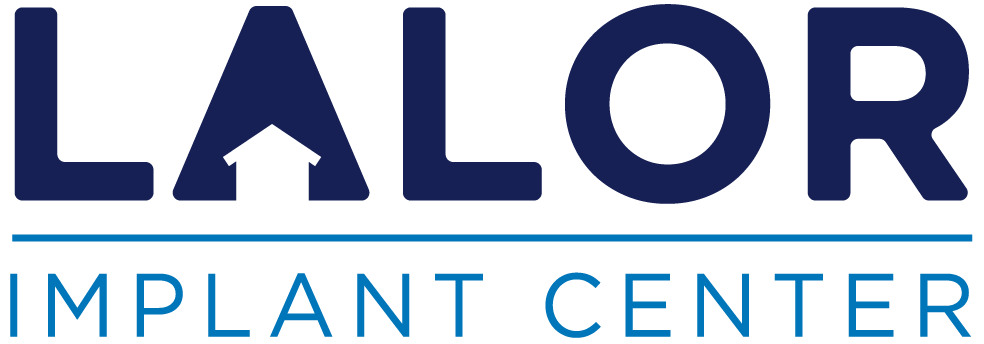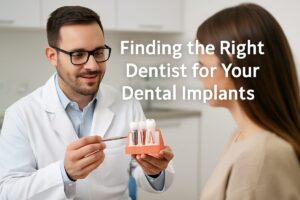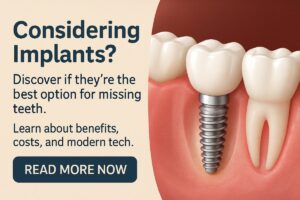If you’ve found yourself thinking “i need dental implants,” this short guide will help you decide if implants are the right next step. You’ll learn common signs that point to implants, how a dentist evaluates you, treatment options compared to bridges or dentures, and clear next steps for a consultation. Read on for practical information to help you move forward.
Common signs that make people think “i need dental implants”
Missing teeth
One or more missing teeth is the most obvious reason people consider implants. Implants replace tooth roots and support natural-looking crowns to restore function and appearance.
Painful, loose, or severely damaged teeth
If a tooth is beyond repair or causes ongoing pain, extraction and implant replacement may be a better long-term solution than repeated fixes.
Difficulty chewing, speaking, or smiling confidently
Struggling with chewing or avoiding social situations because of your teeth are strong signs that implants could improve quality of life and self-confidence.
Shifting teeth or bite changes after tooth loss
When a gap allows nearby teeth to tilt or the bite to change, implants can stop movement and preserve jaw alignment and facial structure.
How a dentist determines if implants are right for you
Clinical exam and dental history
Your dentist or prosthodontist reviews your medical and dental history, checks gum health, and evaluates existing restorations to see if implants are feasible.
Imaging and diagnostics (CBCT, digital x-rays)
3D cone beam CT (CBCT) and digital x-rays show bone levels, nerve positions, and sinus anatomy. These images guide safe implant placement and predict outcomes.
Health, bone quality, and medical considerations
General health, smoking, diabetes control, and bone volume affect candidacy. Bone grafting or sinus lifts can help if bone is thin, but your provider will explain options.
Treatment options: implants versus bridges and dentures
What implants offer (longevity, function, bone preservation)
Implants fuse with bone to preserve jawbone, restore chewing force, and last decades with proper care. They look and feel more like natural teeth than other options.
When a bridge or denture might be better
Bridges or removable dentures can be quicker or less costly up front. They may be preferable if you’re not a candidate for surgery or need a temporary solution.
Typical timeline and recovery for implant treatment
Treatment can range from same-day temporary teeth to staged implant placement with months of healing. Expect some swelling and soreness for a few days after surgery and gradual return to normal eating.
Next steps if you think “i need dental implants”
What to expect at your consultation (digital scans, treatment plan, cost/financing overview)
Your visit will include a clinical exam, digital x-rays or CBCT scans, and a customized treatment plan with timeline and costs. Many practices offer financing or payment plans to help with budgeting.
Key questions to ask your prosthodontist
- Am I a good candidate for implants, and why?
- What imaging will you use for planning?
- Do you perform the surgery and restoration here?
- What are the total costs and financing options?
- What is the expected timeline and success rate for my case?
Lalor Implant Center in Vestal, NY, is led by Dr. Joe Lee, a board-certified prosthodontist and Diplomate of the American Board of Prosthodontics. The practice uses CBCT imaging, CAD/CAM, in-house milling, and 3D printing to plan and deliver predictable implant results.
Ready to learn if “i need dental implants in Vestal, NY” applies to you? Call Lalor Implant Center or book an online consultation to get digital scans, a clear treatment plan, and a cost estimate.






